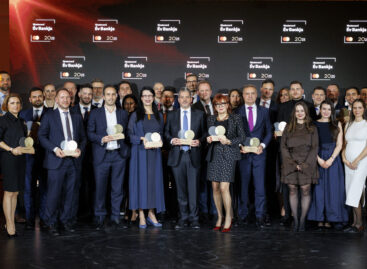Supplier and buyer goals align, but challenges and plans vary by channel – We were learning together (Business Days 2024 Part 1)
From Tuesday the students of the FMCG Open University had the chance to dive into the science of retail trade.

This article is available for reading in Trade magazin 2024/11

Tibor Bodor
head of corporate division
K&H Group
With Emília Krug as the moderator, the programme began with Tibor Bodor, head of corporate division at K&H Group analysing the latest results of the K&H corporate growth index.
The retail sector is slightly more pessimistic than the index average.

Dr. Ákos Kozák
co-founder
Equilibrium Institute
Dr Ákos Kozák, co-founder of Equilibrium Institute shared his views on the economy. He called attention to the good performance of China and the troubles of the German economy – the latter is also “infecting” Hungary.
GDP is 10% below pre-crisis levels and in the first quarter of 2024 we saw a further decline.

Tamás Éder
president
FÉSZ
Tamás Éder, president of the Federation of Responsible Food Manufacturers (FÉSZ), painted a not so rosy picture of the current situation in the food industry. Last year the sector’s performance worsened by 12.1%, which is unprecedented. Operating profit reduced from HUF 500bn in 2022 to HUF 100bn. In his view it isn’t surprising at all that Hungarian food products are expensive.
Growth is difficult to achieve
The three participants of the first roundtable were suppliers and they mainly discussed prices.

Zoltán Balog
general manager
Márka Üdítőgyártó
Zoltán Balog, general manager of Márka Üdítő said that they would have to sell three times as much as they did before June 2022 to reach the profitability level of that period. They feel that if the government introduces new burdens, it will lead to an increase in food inflation and a further drop in consumption. The DRS system also generates additional costs for retail trade.

Gergely Bálint
director of corporate sales
Nestlé
Gergely Bálint, director of corporate sales at Nestlé stressed that their main objective in 2024 is to stop the negative consumer volume trend that began in 2023, which required price cuts in several product categories.
However, this creates profitability issues on the supplier side. There is a situation where food prices are high, but there aren’t enough resources in the value chain to stimulate further consumption, so it is very difficult to grow.

Roland Domoszlai
HoReCa director
HELL Energy
2024 is also about hard work, said Roland Domoszlai, HoReCa director of HELL Energy. As private labels are getting stronger, manufacturers are no longer competing only with each other, but also with the various discounter chains. Manufacturers need to dig deep when they work, making a lot of improvement both in the portfolio and in implementation.
Opportunities beyond the border
The morning programme ended with two presentations.

Dr. Bernadett Petri
ministerial commissioner
Ministry of Public Administration and Regional Development
Dr Bernadett Petri, ministerial commissioner of the Ministry of Public Administration and Regional Development and managing director of the Hungarian Development Promotion Office (MFOI) gave a presentation on directly accessible EU funds. At the moment these funds only account for one third of the EU budget, but the system is undergoing a change: more and more money is becoming available. Currently Hungary can only bring in EUR 13 per capita, while the EU average is EUR 59.
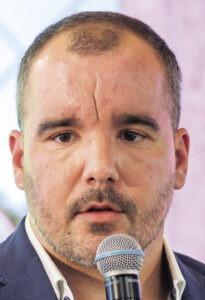
Gergely Giczi
deputy CEO
Agricultural Marketing Centre
Gergely Giczi, deputy CEO of the Agricultural Marketing Centre began his presentation by saying: we are at the start of a development boom, after which new domestic and foreign market opportunities will open up in the next 5 years.
Hungary’s food economy accounts for 30-40% of the total trade surplus of the country. The share of highly processed products in our export is improving: it is 42% at the moment, but the government wants to increase this.
Before lunch, the awards ceremony for the Retail Award of Excellence for Hungarian Products took place.
CBA and PENNY receive Retail Award of Excellence for Hungarian Products, SPAR wins Consumer Award of Excellence again

This year created a special situation for the winners of the Retail Award of Excellence for Hungarian Products. The award – founded by the Hungarian Product Nonprofit Kft. and Trade magazin – was shared by CBA Kereskedelmi Kft. and PENNY Market Kft. The silver medal went to Auchan Hungary Kft., while SPAR Magyarország Kereskedelmi Kft. went home with the bronze medal. The trade special prize was awarded to TISZA-COOP Zrt. and once again, after 2023, SPAR won the Consumer Award of Excellence in 2024.
Up there and down here
After lunch the first roundtable discussion was devoted to government decisions affecting the everyday life of retail trade, with the participation of Dr Olga Felkai Beáta, deputy state secretary of the Ministry of Agriculture, Katalin Neubauer, secretary general of the Hungarian National Trade Association (MNKSZ), Dr Tamás Kozák, secretary general of the National Trade Association (OKSZ) and Dr Imre Nemes, president of the National Food Chain Safety Office (Nébih).

Dr. Beáta Olga Felkai
deputy state secretary
Ministry of Agriculture
Dr Beáta Olga Felkai told: they have always worked together with retail trade, because things won’t work any other way. There is no use in subsidies or in development projects if the supported companies can’t sell their products. From 1 August consumer protection also belongs to the Ministry for National Economy.

Dr. Imre Nemes
president
Nébih
As regards the concentration of consumer protection Dr Imre Nemes revealed: negotiations are underway between the Ministry of Agriculture, the Ministry for National Economy and Nébih to set up a new retail trade office.

Dr. Tamás Kozák
secretary general
National Trade Association
Dr Tamás Kozák opined that interesting narratives have emerged recently, with profit becoming sort of a negative word. He mentioned “profit-driven inflation” as perhaps a new economic phenomenon, the impact of which may have to be taken into account when preparing economic decisions.

Katalin Neubauer
secretary general
Hungarian National Trade Association
Katalin Neubauer admitted that the price monitoring system was a good initiative, because consumer prices were increasing rapidly. Mandatory promotions also helped to bring prices down.

On Tuesday, the whole value chain and all its challenges and opportunities were discussed at the Business Days conference
Encouraging signs from distributors
The participants of the next roundtable were Zoltán Becze, general manager of Orbico, Csaba Kanizsai-Tóth, managing director of FÁN Group, Dr Beáta Kápolna, offer management director of METRO, Péter Szemes, managing director of Maresi Foodbroker and Tamás Tőkey, CEO of MIRBEST, who reviewed the developments in the sector from the perspective of wholesalers and distributors.

Zoltán Becze
general manager
Orbico
According to Zoltán Becze, last year was a good one for Orbico: they invested in prices and this resulted in growth in several – otherwise shrinking – categories, e.g. coffee, crisps, mineral water.

Csaba Kanizsai-Tóth
managing director
FÁN Group
Csaba Kanizsai-Tóth’s observation is that consumption habits have changed a lot in the countryside. Demand in traditional retail outlets has moved towards cheaper products; for 2025 he expects a 5-10% growth. 2023 wasn’t an easy year for METRO either, but the second quarter of 2024 already showed positive results.

Dr. Beáta Kápolna
offer management director
METRO
Dr Beáta Kápolna told that the volume decline of the HoReCa sector is slowing down and the market is recovering, even if it isn’t functioning exactly as before. METRO sees a growing demand for private labels. In the new financial, year starting on 1 October, METRO will introduce a delivery service for independent retailers.

Tamás Tőkey
CEO
MIRBEST
Figures for the last 3 months were already very encouraging at MIRBEST, reported Tamás Tőkey. In the next period the company is going to concentrate on digitalisation and database management. They are also trying to diversify their private label portfolio.

Péter Szemes
managing director
Maresi Foodbroker
Péter Szemes informed that they added new brands to the Maresi Foodbroker portfolio and they distribute 30 brands now. For them convenience categories are growing the fastest, while impulse products produced the biggest decline.

Ferenc B. Tóth
chief business development officer
IQOM
During the discussion Ferenc B. Tóth, chief business development officer of IQOM gave a presentation about their payment solutions for wholesalers.
Chain, chain, value chain
Panellists analysed the FMCG situation from the sourcing side in the following roundtable discussion.
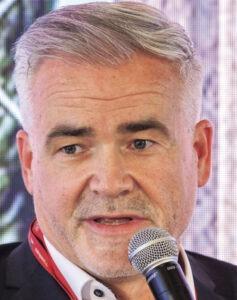
László Varga
product director
Auchan
László Varga, product director of Auchan pointed out that the challenges of recent years have acted as a catalyst in the relationship between manufacturers and retailers. Sharing information helps suppliers to better understand their customers. Unpredictability and high tax burdens are a serious risk in the value chain.

Tamás Kámán
product director
Tesco
Tamás Kámán, product director of Tesco underlined that shoppers always want to find the best value for money. Consumers have recently decided in the shops which products they want to buy and at what price level. At Tesco promotional sales increased by a third. Big suppliers tend to have a better overview of the market and react faster than small ones.

Krisztina Várkonyi
head of purchasing
SPAR
This is why SPAR has created a special team to educate small suppliers on the optimal price point to which their product should be “brought down”, in order to generate higher volume sales and remain in the portfolio, explained SPAR’s head of purchasing Krisztina Várkonyi.

Zoltán Noszlopy
deputy CEO and purchasing director
CBA
One of CBA’s main expectations from its suppliers is that their product should be worth selling for the chain, said Zoltán Noszlopy, deputy CEO and purchasing director of CBA. When the market dictates that they have to lower the price, CBA does it, but if the product doesn’t have the expected margin, they have no choice but to substitute it.

Géza Vincze
director of purchasing
Penny
Géza Vincze, director of purchasing at Penny stressed that when cooperating, no effort should be spared to ensure that the parties understand each other’s needs. Communication is particularly important when a special situation arises. Penny is currently developing a strategy on the basis of such discussions.

Lectures were held to full houses both inside the hall and outside in hotel venues, where you could also follow the courses
Variations on saving

Gergő Soltész
investment and financial expert
Why aren’t Hungarians buying? This is the question that Gergő Soltész, investment and financial expert answered in his presentation: because we prefer to save. Since 2020 retail consumption hasn’t exceeded household consumption. The household consumption rate is low relative to our level of development, primarily owing to the high savings rate, low overall consumer confidence and rising housing prices.

Andreas Christou
managing director
RetailZoom
Andreas Christou, managing director of RetailZoom, gave a status report on domestic retail chains, stating that 90% of the sales increase in 2023 was generated by inflation. Shoppers have reacted to inflation by reducing basket sizes (first they stopped buying impulse and convenience products) and by switching to cheaper products. Meanwhile, the number of transactions increased.
(Limited) room for manoeuvre
On Tuesday the last roundtable session was attended by representatives of Hungarian retail chains.

Zsolt Gyelán
vice president
CBA
Zsolt Gyelán, vice president of CBA said that they see growth first and foremost in drug product sales. This is because drugstores have brought prices down and suppliers are forced to offer better prices to domestic chains if they want to sell in this channel too.
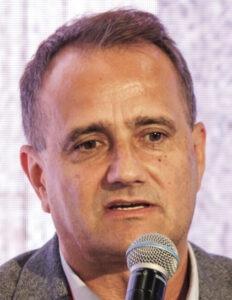
Tibor Fekete
board member
CO-OP Hungary
Tibor Fekete, board member of CO-OP Hungary and president-CEO of Coop Szolnok was a bit more optimistic. He pointed out that elections are coming soon, which could be good for the FMCG sector.

Lívia Jeszenszki
managing director
Reál
A big bounce back is not expected, but slow growth can occur. Lívia Jeszenszki, managing director of Reál expressed the view that a large proportion of their customers are low-income. There is also a kind of consciousness among those with higher incomes – they don’t necessarily want to spend their money on food. Reál sees the conquest of promotions and manufacturers have limited space for manoeuvre in this situation.

Tamás Jósvai
managing director
Tom Market
According to Tamás Jósvai, managing director of Tom Market, discounters have “rewired” the way shoppers think about products over the past 5-10 years. Tom Market stores form a niche type of convenience network, they don’t wish to compete with discounters and this is reflected in their pricing too. They are offering complementary services, products and value propositions.
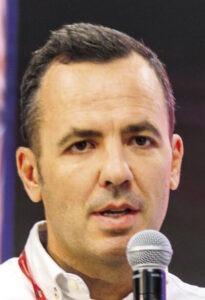
Gyula Gallina
business development director
Mastercard
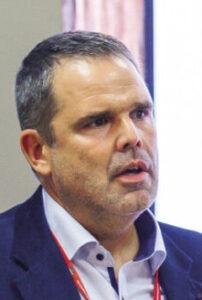
Ákos Kontár
chief operating officer
Checksum
The day ended with two presentations: Ákos Kontár, chief operating officer of Checksum spoke about their digital, data-driven services that facilitate the work of sales reps, while Gyula Gallina, business development director of Mastercard shed light on the benefits of effective personalisation in retail. //

On Tuesday night, the ABBA Tribute Show brought a real retro party to the lobby after dinner and before the much anticipated prize draw
Click here to view more photos about Tuesday of the 2024 Business Days.
The event video is available to view here.
Related news
Nearly 140 domestic suppliers, 60% growth – SPAR Regions Treasures program accelerates with AI solutions
🎧 Hallgasd a cikket: Lejátszás Szünet Folytatás Leállítás Nyelv: Auto…
Read more >OTP Bank won the grand prize of the 20th Mastercard – Bank of the Year competition
🎧 Hallgasd a cikket: Lejátszás Szünet Folytatás Leállítás Nyelv: Auto…
Read more >Related news
Retail sales of organic products in Hungary increased by 13.9% – our country is the second fastest growing market in the European Union
🎧 Hallgasd a cikket: Lejátszás Szünet Folytatás Leállítás Nyelv: Auto…
Read more >Nearly 140 domestic suppliers, 60% growth – SPAR Regions Treasures program accelerates with AI solutions
🎧 Hallgasd a cikket: Lejátszás Szünet Folytatás Leállítás Nyelv: Auto…
Read more >



